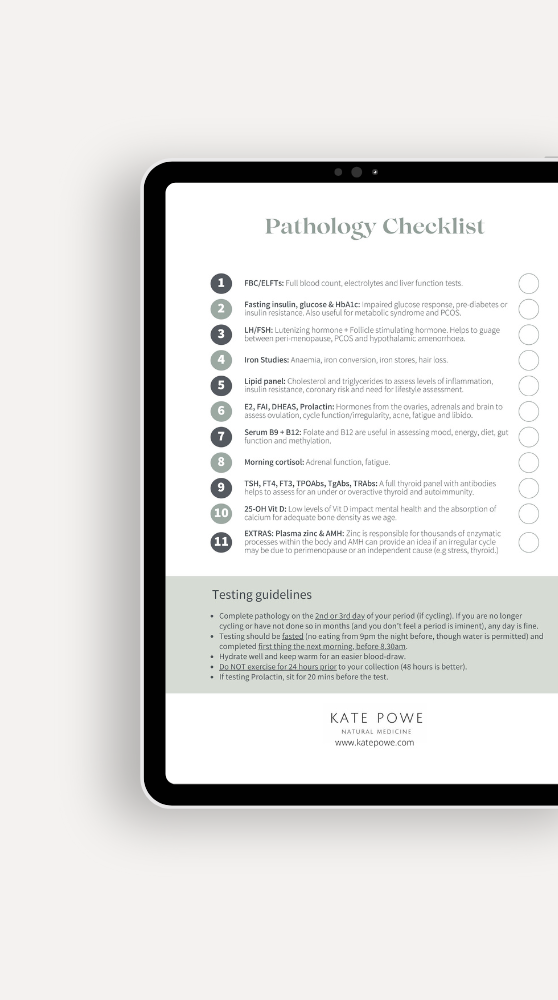I am seeing a lot of women in clinic with non-classical, low thyroid function pathology. And I mean about 80% of them, my own included. And the pattern is this…
Low TSH, Low T4, Low T3.
In typical low thyroid function (or hypothyroid), the TSH (the thyroid stimulating hormone that is the whip to tell the thyroid to pick it up princess) will be raised, and T4/T3 (the hormone that’s sleeping on the job) will be low.
But I was getting very curious over this alternate pattern of sleeping hormones and low whip. What was the thyroid doing? Why wasn’t the whip whipping? Had the whole thing gone to sleep?
Now, there are a pile of things which spring off this topic in what is going on and why, but I want to get to the crux of my brain-cell explosion this week and this is it:
- It’s called a hibernating thyroid and it really is a thing!
- A hibernating thyroid should not be woken up before it wants to re-emerge on its own accord. Think of how cranky a bear would be if you attempted a mid-winter wake up call…
- A hibernating thyroid has purpose, like most things in our body. As clinicians (medical or natural) we often see imbalance and think we must rebalance immediately. If the thyroid is low, we sometimes bypass the “Why?” and plough straight to the “Let’s ramp it up” solution. But there is always method to the body’s madness. As Dr Mark Donohoe puts it, things go wrong slower when the body’s in a hibernating state. If we amp up the thyroid too quickly and push beyond its natural mechanism of protection, we increase the risks of messing up royally and pushing the body into a much more serious illness.
OK so all that is well and good, but I haven’t even gotten to the good part yet.
Most of us recognise there’s a link between coeliac or at the very least, gluten sensitivity, and autoimmune or inflammatory gut issues. We will often run a coeliac panel to check antibodies and reactivity to gluten. But the tests are not definitive or infallible, and we come across those people who don’t seem to react terribly to gluten, have no antibodies, and so we’re left with a bit of a half-hearted, “you should be ok” type conclusion.
But get this …
- We know that about 95% of coeliacs have the coeliac gene. That means to develop coeliac in the first place, you pretty much need the genetics, i.e. HLA-DQ2/8; but
- Only 10% of people who have the coeliac gene ever go on to develop coeliac disease;
But wait for it…
- 50% of women who have the coeliac gene go on to develop thyroiditis. 50 PERCENT!
And what’s the correlation? Or what puts us at higher risk for this unwanted outcome? High exposure to gluten as a child.
Now I don’t know about you but growing up in Sydney in the 70s was all about toast or soggy Weet-Bix for breakfast, white bread sandwiches for lunch and … well ok in our house it was pretty much meat, meat and more meat for dinner (including disgusting ham steaks with pineapple and smoked cod in gloopy corn and white sauce – bleugh), with a cheesy/tomato-sauce pasta often featuring on a Sunday night. It’s amazing we all survived!
So 3 take-outs:
- We need to be testing not just for coeliac antibodies, but also for the coeliac gene. And not just to detect potential coeliac disease. It may have less to do with coeliac (for which you really need a biopsy) and more to do with the propensity for thyroid gland inflammation, low thyroid function and potential thyroid disease 30 years down the track.
- Even if you are not coeliac but have the gene, reduce the amount of gluten you’re exposed to throughout your life (take it from someone who didn’t and is now gently prodding her thyroid to see if it’s still breathing…)
- If you find your thyroid is in hibernation, don’t stick an alarm clock under its pillow. And what I mean by this is don’t jump straight to high dose iodine, or thyroid hormone (that may be warranted but other things should be put into place first) or high impact exercise in the attempt to lose weight and gain energy. Address the reason WHY it has taken a nana nap and a pretty good place to start is stress:
- Don’t forget it’s not always about current stress, but the long-term impact of what you’ve put your body through over years.
- Don’t discount physical as well as mental/emotional stress (or transition stress where your hormones are on a rollercoaster ride like peri-menopause)
- Support your thyroid and adrenals with a clean diet, herbs and nutritional support, meditation, earthing, getting out into nature and lots and lots of antioxidants to reduce inflammation.
- Look at the mind body aspects of low thyroid function or an inflamed thyroid that sits at the throat chakra: What have you or are you suppressing that is important to you? What are you not saying? Where has your voice, creativity, anger, passion or purpose been silenced?
Kate is a qualified naturopath who is passionate about helping women heal from hormonal havoc and inspiring women to know their own power, worth and wisdom.
Kate offers one-on-one Skype consults for irregular cycles, PMS and period pain, endometriosis, PCOS, peri-menopause, mood swings, fatigue and mental and emotional stress.
Simply drop me an email to see how I can help you!







5 thoughts on “Low Thyroid Function and the Coeliac Gene – Is Your Thyroid Hibernating?”
Really loved this article! I have strange things going on with thyroid, my t3 and t4 seem normal and my TSH is 3 mIU/L.
And years ago a switched on gp tested me for thyroid antibodies and it came back positive.
I don’t have a celiac “allergy”, but there is goitre disease on my fathers side.
Currently I have insulin resistant PCOS.
I would really love a consult with you to work out what is going on
Hi Danielle, thanks for the feedback. And I’m glad your doctor tested for antibodies as it’s so often missed with “euthyroid” path results (though with a TSH at 3.0 I’d consider that already a flag for either subclinical hypothyroid or as you’ve found, hashimoto’s). Please feel free to contact me to arrange a consult at info@katepowe.com so I can provide you with further information.
Hi Kate, This is a great article and something I had queried myself as a practitioner when I see results like this. So this is very helpful. I do already make sure my patients avoid gluten if they have Hashimoto’s for this reason.
But are you suggesting that if a patient has the coeliac gene- which I don’t test for but may start testing for- it can cause other sorts of thyroid imbalances? Which also includes underactive thyroid without raised thyroid antibodies (ie. not autoimmune)?
I don’t normally take my patients with underactive thyroid who have normal thyroid antibodies off ALL gluten, but maybe I should consider it.. Let me know. Much appreciated. Good work you are doing!
Hi Kirsten,
Thanks for the comment! Interesting correlation between coeliac gene and long-term exposure to gluten in thyroiditis. In general, I see thyroid as the canary in the coal mine and usually look upstream a little to see what triggered the thyroid. If we can correct the triggering event (whether that be infection, inflammation, or mental/emotional triggers) then hopefully the thyroid response improves. Coeliac gene is one of those factors that increases risk (but not the be all and end all). And remember this was stating not just having the coeliac gene but amount of lifetime exposure to gluten in that mix. The blueprint plus the wrong environment could therefore be triggers for thyroiditis, but all factors need to be taken into account – mental, emotional, physical (and spiritual if open to going there). x
Hi Kate, This is a great article and something I had queried myself as a practitioner when I see results like this. So this is very helpful.
And I do already make sure my patients avoid gluten if they have auto-immune thyroiditis like Hashimoto’s due to the link with coeliac’s/gluten sensitivity.
But are you suggesting that if a patient has the coeliac gene (which I don’t test for but may start testing for) it can cause other sorts of thyroid imbalances? Which also includes underactive thyroid without raised thyroid antibodies (ie. not autoimmune)?
I don’t normally take my patients with underactive thyroid who have normal thyroid antibodies off ALL gluten, but maybe I should consider it.. Let me know. Much appreciated. Good work you are doing!
Comments are closed.